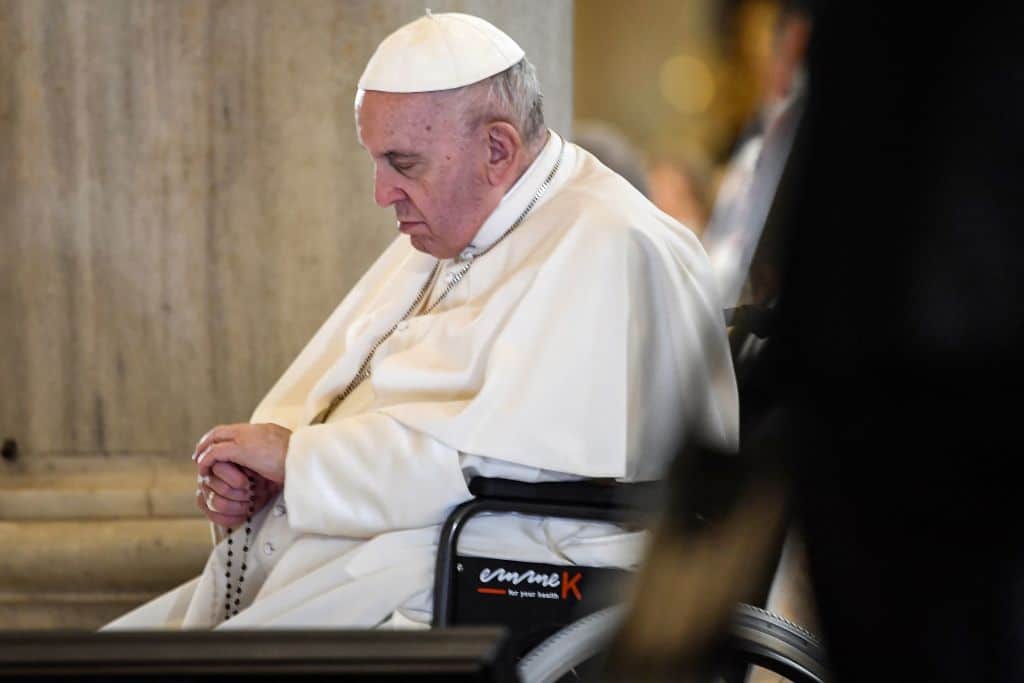Entertaining the prospect of a papal resignation
It is not, as the Herald goes to press, apparent that the pope will resign, but plainly there is speculation that he may do so this year. He is suffering mobility problems, which mean he often uses a wheelchair, and he can no longer travel for long distances by car or by helicopter. He has The post Entertaining the prospect of a papal resignation appeared first on Catholic Herald.

It is not, as the Herald goes to press, apparent that the pope will resign, but plainly there is speculation that he may do so this year. He is suffering mobility problems, which mean he often uses a wheelchair, and he can no longer travel for long distances by car or by helicopter. He has had to postpone visits to Lebanon and South Sudan and if he does manage to visit Canada to express his remorse on behalf of the Church for the crimes committed against indigenous children in church-run homes, his itinerary will be curtailed.
It is not, of course, necessary that popes should resign if they feel they cannot function as well as they did, or suffer ill health. Prior to the resignation of Pope Benedict, there was only one pope who left office, Celestine V, who resigned in 1294, and Pope Francis, interestingly, is to visit his tomb at the end of August. John Paul II was incapacitated by Parkinson’s disease for his last years. As for the ability to travel, it is really only with John Paul II that popes felt the necessity to travel outside Italy at all. Strictly speaking, the pope could function perfectly well inside the Vatican. But if that is not how he sees his office, if he feels that ill health and immobility prevent him from exercising it to the best of his ability, then he could resign the papacy.
But not before he has done as much as humanly possible to determine the character of his successor. As we report in this issue, the consistory of cardinals in August will see him create 16 new cardinals and load the membership of the College of Cardinals heavily with his own appointments before the next conclave. Indeed, once the new intake is included, he will have created 62 per cent of the cardinals of voting age, many of them expected to share his own view of the Church and the world.
Among them is Archbishop Arthur Roche, the Yorkshire-born Prefect of the Congregation for Divine Worship, who has repressed access to the Latin Mass in the Extraordinary form, or Tridentine rite – a manifestly illiberal measure which has alienated many loyal Catholics. Bishop Oscar Cantoni of Como, Italy, is also to be made a cardinal; he was among the first to apply the apostolic exhortation Amoris laetitia, in the sense of permitting, under certain conditions, divorced and remarried Catholics to receive Holy Communion.
He has also elevated the liberal Bishop Robert McElroy of San Diego over the more rigorously orthodox archbishops of Los Angeles and San Francisco. These appointments are intended to ensure that the next pope is made in his image. Francis is a spiritual man but he is by no means unworldly. He has a talent for collecting enemies who should be his friends. The Holy Father has an authoritarian aspect as well as a genial side; witness his unhappy handling of the Order of Malta, going above the constitution of the 1,000-year-old Order to appoint a new Grand Master – Canadian lawyer Fra John Dunlap – before the funeral of the previous Grand Master who died suddenly on 7 June.
The prospect of a papal resignation offers the possibility of having three successors of St Peter in the Vatican at the same time, an unprecedented situation. Benedict has been discreet but there is no reason why Francis should not continue to exercise his distinctive charism, to engage with people who feel marginalised within the Church, offering support to the excluded. He has a genius for the imaginative gesture; his empathy should not be wasted in retirement, if that is to happen. He could opt to play a part in shaping the synodal process as it nears conclusion, given that this is the single policy of his pontificate by which he sets most store.
True, the option of retiring to a life of prayer, as Benedict has done, is honourable, but the office of pope emeritus is quite new, and can be framed any way Francis likes, and his successor allows.
But this is to anticipate. The pope is still very much pope and he still has work to do. His mission of reconciliation with survivors of clerical sexual abuse and the Canadian indigenous people harmed in church schools is important unfinished business. And he could even now, if he wanted, treat liturgical conservatives respectfully, not as potential schismatics. Indeed, if there is one concept Francis lacks, it is the concept of a loyal opposition.
We hope and pray that the pope’s health problems are resolved. But if we are approaching the end of his pontificate, it may not be the end of Francis.

The post Entertaining the prospect of a papal resignation appeared first on Catholic Herald.














